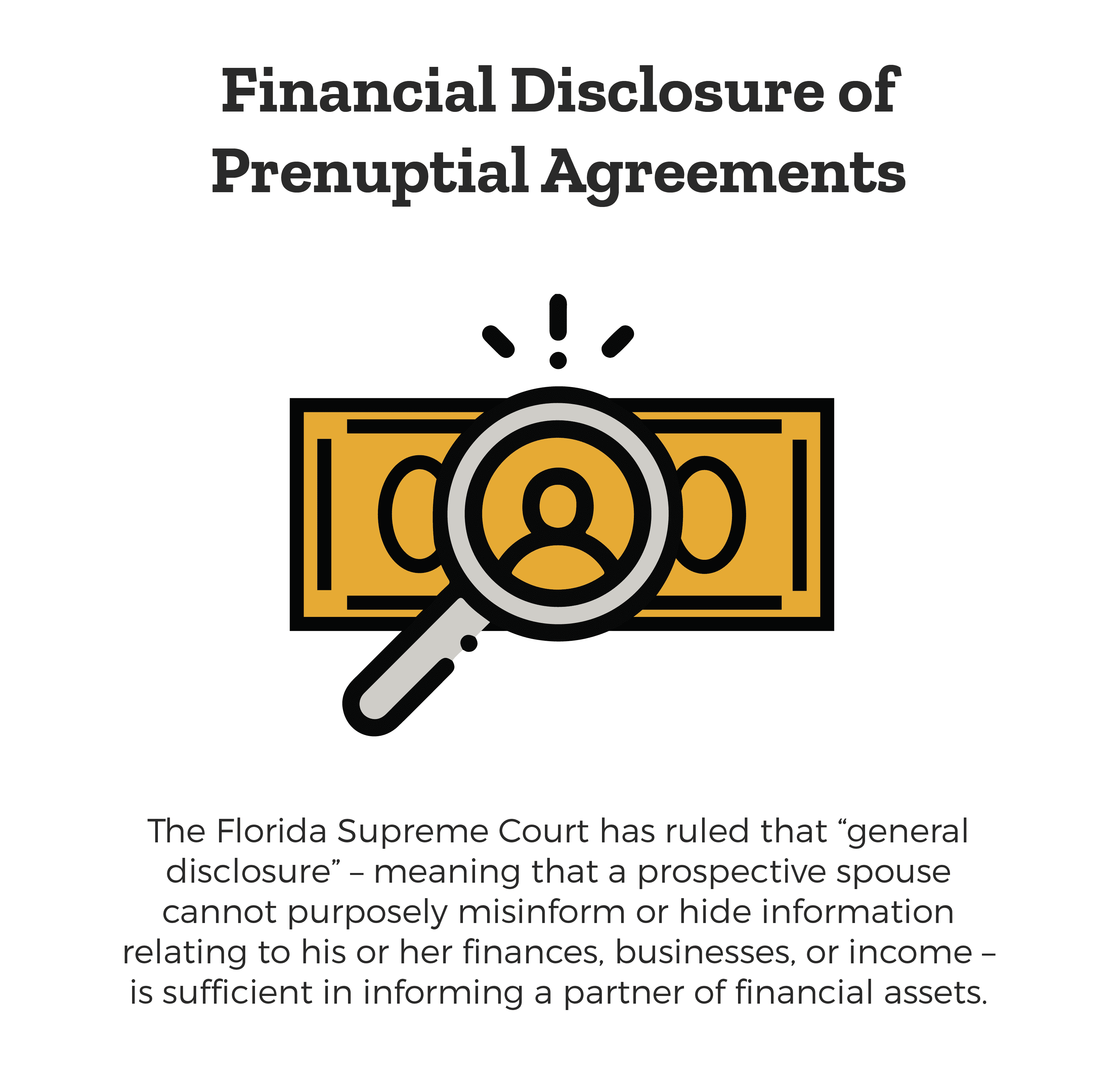Making Premarital Financial Plans
A premarital or prenuptial agreement is a contract made in contemplation of marriage. Also referred to as a “prenup,” prenuptial agreements are governed under contract law principles. In Florida, they are administered under the Uniform Premarital Agreement Act found in Florida Statute 61.079.
Florida law will govern premarital contracts and disputes when dissolution of marriage is filed in Florida. For Florida law to govern, one party must have resided in Florida for at least six months before the filing of the divorce. Additionally, a premarital agreement may have a “choice of law” clause built in the contract. A choice of law clause will dictate which state law will govern the contract in the event of a divorce proceeding.
Prenuptial agreements can be broad, but they are generally used to provide reasonable financial disclosures between the parties and to settle marital property and financial obligations in the event of a separation or divorce. Many people might want to keep premarital property separate, including businesses and entities that were started before joining in marriage. Without an agreement to the contrary, the state will distribute marital property according to state law. A premarital agreement, however, will arrange for how all property will be settled as decided before the marriage. Additionally, prenuptial agreements can either dispose of or give allowances for alimony, spousal support, or ownership rights.

Value of a Prenuptial Agreement
As approximately half of the marriages end in divorce, many family law attorneys give free consultations so that people can at least inquire and ask legal questions related to marriage and cohabitation. If a couple ever initiates divorce proceedings, the separation will be much easier, as they won’t have to litigate those previously settled issues. This can also save money in terms of legal representation and asset negotiation. Prenuptial agreements can always be changed or modified after the date of marriage if both parties agree and sign off the changes.
Prenuptial Agreements and Postnuptial Agreements Both Governed Under the Same Law
Prenuptial agreements are made before marriage with the intent to be effective on the date of marriage and after. Postnuptial agreements are contracts made into and incorporated after a marriage has already taken place. Both can deal with the same issues and are governed by the same law, the Uniform Premarital Agreement Act.
At divorce, one of the parties must formally ask the court or judge to incorporate the agreement in the judgment of divorce.
Florida Favors Enforcement
Florida law generally supports the enforcement of premarital agreements based on allowing people the freedom to contract. Thus, unless it can be shown that there is a reason not to allow the contract, they will favor upholding it. Prenups can also generally include the right to provide instructions related to any matter surrounding marriage, so long as the provision does not violate the law or is against public policy.
For premarital agreements to be admitted and upheld, they must comply under Florida statutes. Prenuptial and postnuptial agreements include many requirements, the first of which dictates that the agreement must be in writing and signed by both parties. Like all contracts, the agreements must be made voluntarily, which means without any force, duress, or pressure. Additionally, both parties must have entered with knowledge of the full disclosure of the prospective spouse’s finances. The Florida Supreme Court has ruled that “general disclosure” is sufficient, meaning that a prospective spouse cannot purposely misinform or hide information relating to his or her finances, businesses, or income.

Determining Invalid Prenups
A prospective spouse is free to waive claims to alimony, marital property, and ownership rights if he or she did so voluntarily and knowingly with reasonable disclosure. The court cannot dismiss a validly executed contract. However, a spouse may ask the court to set aside a premarital agreement that was improper in how it was executed, thus making it invalid. In this case, the disputing party holds the burden to prove to the court why the agreement should not be upheld.
A Florida prenuptial agreement can be invalid due to being signed as a result of fraud, deceit, duress, coercion, misrepresentation, or overreaching. One example of an invalidating behavior would be wherein one prospective spouse threatens the other to sign an agreement or else not follow through with a marriage.
Void Marriages Can Never Have Enforceable Prenups
Void marriages are marriages that are invalid and never legally existed. Examples of void marriages are bigamy (where one person is already legally married to another person), incest, or underage. As a marriage must have legally occurred for a prenuptial agreement to be enforced, agreements made in contemplation of void marriages are also void.
Public Policy Concerns
A prenup can include clauses waiving alimony or spousal support in the event of a divorce. However, Florida state law provides an exemption to instances when an ex-spouse becomes a “ward of the state” and survives under public assistance. Thus, if a person voluntarily gives up claims to alimony, but they are subsequently forced on public assistance, the court will deem it fair to modify the original terms of the agreement.
Any consideration made regarding children or future children cannot be enforced in a prenuptial agreement. Family law issues such as child custody or child support are determined by the legal standard known as “the best interests of the child.” As determining a child’s best interest is dependent on many circumstances, issues such as custody, parenting time, or child support awards can change. Therefore, it is against the law for couples to predetermine child custody, parenting time, or for a spouse to waive any child support claims as a part of a premarital agreement.
Drafting a Prenup
In the signing of a prenup, it is best to have an attorney draft the document and two separate attorneys (a separate attorney for each prospective spouse) to give advice. Keep in mind that the lawyers reviewing the document should have no relation to either you, your spouse, or to each other. The respective law firms should specialize in family law and expertise on Florida prenuptial agreements and estate planning.
